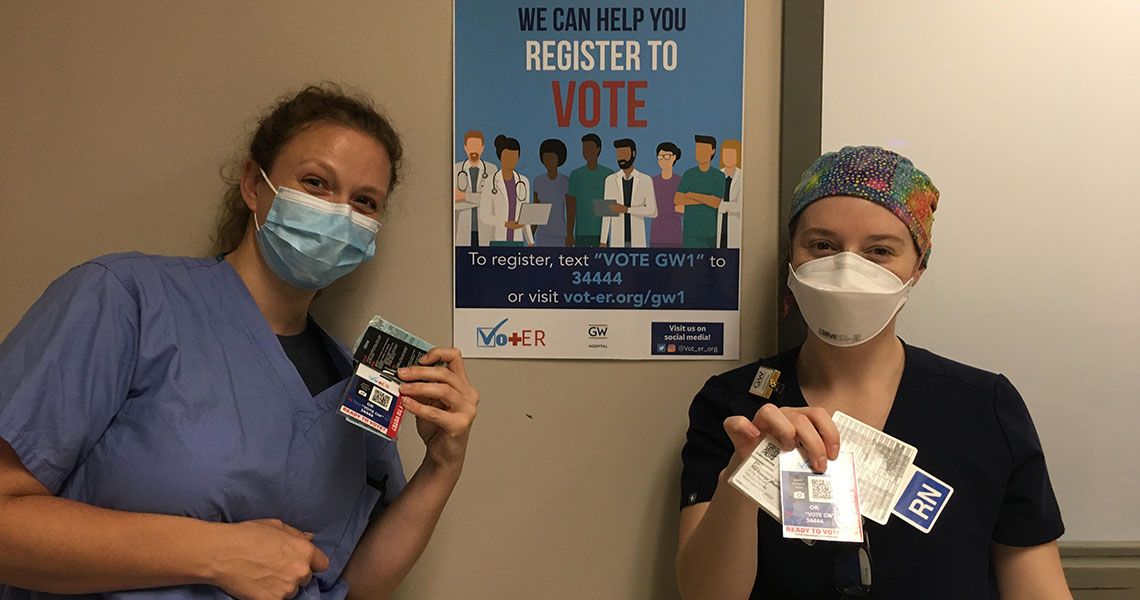As the coronavirus pandemic continues to tighten its grip across the United States, voter registration has dropped in 2020 compared to 2016, according to the Center for Election Innovation and Research. At the George Washington University (GW) School of Medicine and Health Sciences (SMHS), providers and students are working to increase the District of Columbia’s numbers in an unusual place: the emergency department.
After hearing about nonpartisan, nonprofit VotER through a friend at the beginning of 2020, Kunj Bhatt, MD ’20, at the time a fourth-year MD student, and Pranav Kaul, then a third-year MD student, knew it would be a great way to help patients get registered to vote for the November 2020 election.
VotER was founded by Alister Martin, MD, MPP, at Massachusetts General Hospital and has grown into a national program with the goal of getting patients to the polls by helping them in the voter registration process.
“Health care over the past few years has been one of the top issues Americans are concerned about when it comes to making decisions on voting,” noted Bhatt, who just months ago started his emergency medicine residency at Icahn School of Medicine at Mount Sinai. “But despite the importance of that, voter registration is declining. By encouraging patients in the ER to register to vote, we’re supporting citizens who have been underrepresented in the voting process and giving power to the patients we’re treating.”
The program, explained Kaul, originally had two components: a kiosk set up with an iPad that linked to a voter registration page, and then posters and pamphlets with text code or a QR code that could be scanned with a smartphone taking the user to the registration link. However, with the emergence of the pandemic, they quickly realized the iPad kiosk wouldn’t be a safe option.
Instead, providers at the hospital have been given badges with the QR codes to wear around their necks, and signs have been plastered throughout the ER about the campaign with accompanying pamphlets with voting information.
Kaul noted that it’s important not to disrupt the provider-patient relationship, but if a patient sees a poster or badge and asks about the initiative, the provider can then offer them more information on how to register to vote.
“As I think about what the world may look like when I’m a practicing physician, I think about how I hope to do my best for my patients within the hospital, while never forgetting that the bulk of their life is spent outside its walls dealing with social and economic issues that impact their health,” he said. “Consequently, our experience with VotER has been one small opportunity to broaden the physician’s toolbox in addressing those more systemic challenges.”
Bhatt added that helping patients register to vote is a great nonpartisan approach to getting them engage in the political process. “We need and want more people to participate in upcoming elections, regardless of which side of the aisle they’re on, to get them engaged no matter their views.”
“VotER’s mission is to give all patients a voice, and that really resonated with me,” said Marisa Dowling, MD, MPP, health policy fellow in the Department of Emergency Medicine at SMHS, who has been helping with the VotER effort.
She said since the project launched at the very end of August, they have handed out VotER badges to more than 100 staff members in the emergency department. And, in just the first week, 57 patients were registered to vote, she added.
“That puts us on a great trajectory,” she said. “We hope to accelerate from there.”
They also are hoping to expand the effort beyond the ER into other departments and clinics, Dowling said, possibly collaborating with wider voter registration efforts on the GW campus.
“Working in the ER you realize that no amount of medicine can make someone who lacks stable housing, food, or finances healthy,” she said. “These are the social determinants of health. And the fact is that the social determinants of health are decided at the ballot box. As physicians, we are trained to help our patients’ physical health and mental health. But with VotER, we as physicians are called to go a step further and address patients’ civic health.”



